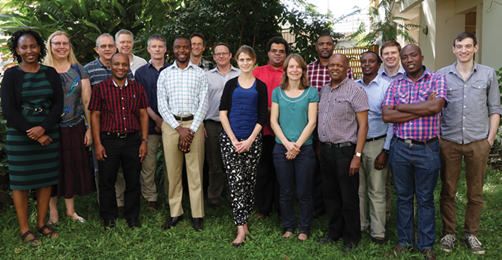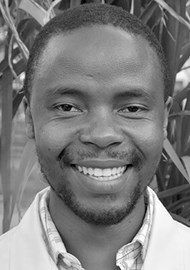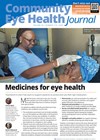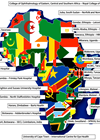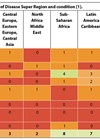The aim is to build capacity for research in the region covered by the College of Ophthalmology of Eastern, Central and Southern Africa (COECSA). The project will build research capacity in three ophthalmology training institutions by ‘training the trainers’ and enhancing training in research methods for trainee ophthalmologists. It will also establish a research network within COECSA that other ophthalmology training institutions will be able to join in the future. The project is funded by the British Council for the Prevention of Blindness [1].
The three training institutions are Kilimanjaro Christian Medical Centre (KCMC) in Tanzania, University of Mbarara / Ruharo Eye Centre in Uganda and University of Nairobi (UoN) / Kenyatta National Hospital in Kenya. All three participate in the VISION 2020 LINKS Programme and the existing network to develop diabetic retinopathy services (DR-NET).
Building capacity for ophthalmic research in low- and middle-income countries is one of the aims of the VISION 2020 LINKS Programme. The International Centre for Eye Health (ICEH) [2] at the London School of Hygiene & Tropical Medicine (LSHTM) is working with COECSA and the Royal College of Ophthalmologists (RCOphth) [3] to develop research capacity.
The main outcomes will be:
- A team of two trainers able to take leadership roles in research training and mentorship in the three COECSA-accredited institutions.
- Establishment of a Research Network in ophthalmology between COECSA-accredited eye training institutions.
- Strengthening of research methods within the ophthalmology training curriculum in the three institutions.
- An increase in the quantity and quality of research output in the three institutions over an initial five-year period, measured by:
a. the number and quality (impact factor) of published papers
b. the number of papers / posters at conferences
c. the number and amount of research grants received.
This project addresses the need for enhanced research capacity in the region by training trainers of ophthalmologists in the three eye care training institutions. The trainers will cascade their skills in research methods to their trainees. Each trainee ophthalmologist undertakes a three or four-year Master of Medicine (MMed) programme in ophthalmology, depending on the institution. MMed trainees are required to do a research dissertation as part of their training. The project will enhance the quality of research carried out by MMed trainees in the region during their training and in their future careers, which will help them to drive future improvements in eye care service provision for the region.
The COECSA-RCOphth LINK has been working with the ophthalmology training institutions across all the countries in COECSA and has helped to harmonise MMed training across the region.
Participants in the Research Mentorship Workshop at KCMC, Moshi, Tanzania.
Project progress
A Research Mentorship Workshop was held in early 2017 at KCMC in Tanzania. Ophthalmologists from the three VISION 2020 LINKS attended. The workshop focused on effective mentorship of postgraduate ophthalmology trainees (MMeds).
Aims of the workshop
- To deliver training on research mentorship of MMed trainees to lecturers from three key training institutions in the COECSA region.
- To obtain information about the needs and challenges faced by mentors and mentees in the COECSA region.
- To formulate LINK-specific action plans for ongoing mentorship.
- To identify ways in which ICEH can support effective mentorship going forward.
Participants
There were 12 participants from three LINKS (two lecturers / MMed supervisors from each of the three institutions (UoN, Mbarara and KCMC) plus a UK participant from each LINK. There was senior representation from COECSA and its LINK partner, the RCOphth. The workshop was facilitated by Allen Foster, co-Director of ICEH, assisted by colleagues from ICEH and observers from KCMC.
Training
Each delegate was provided with a practical manual entitled ‘How to plan, implement and report a research study for a Masters Dissertation in Eye Health’. Three key areas of a research project were highlighted: (1) planning and preparation, (2) implementation, (3) analysis and communication. Following training in each area, workshop participants undertook practical exercises in their LINK teams to consolidate their knowledge and explore potential pitfalls.
1. Planning and preparation
Without good planning a project will not succeed. This is usually an iterative process for which sufficient time needs to be allocated. Students may benefit from cross-disciplinary supervision. The planning process starts with the research question. Criteria for determining an appropriate research question include feasibility (complexity, time, resources, likelihood of achieving meaningful results), interest and relevance to student, supervisor and institution, public health importance (the “so what?” question), novelty, and the extent to which the research can be generalised and published. Weighted scoring systems and decision-making matrices may be helpful. Types of project suitable for a Masters student include descriptive studies that are limited, specific and cross-sectional (for example, a situational analysis of service provision).
Principal components of project planning include: conducting a literature review, determining the research method(s) and how the data will be collected, producing an analysis plan, obtaining ethical approval and securing funds. Students benefit from sequential objectives allowing them to explore the research question in increasing depth. When considering novelty, the project should challenge the student to develop research methods and not simply repeat a previous study in a different context.
Tips for planning a research project
- Evaluate a study plan using the ‘PICO’ framework: Population, Intervention, Comparison, Outcome [4].
- Document the process of designing a project.
- Allow time to obtain ethical approval.
- Require the student to draft the methods chapter before starting the study.
- Check the methods will answer the research question.
- Prepare an analysis and presentation plan in the planning stage.
2. Implementing and conducting the research
Conducting a research study requires meetings with relevant stakeholders, identifying and training a research team, and deciding who is responsible for which data collection task. It is important to consider the impact of the researcher, context and process on the data collected. Training of research assistants helps to standardise data collection.
Tips for successful implementation
- Allocate time and resources to pilot principal components of the project, including data collection tools.
- Regularly reassess whether the study time-plan is practical and feasible.
- Review the research objectives regularly to prevent ‘mission creep’.
3. Analysing, interpreting and communicating the research results
When analysing quantitative data it is important to consider bias, confounding and random error. Graphical methods are extremely helpful in order to visualise and understand numerical data. Subtleties in the data may remain hidden if only simplistic models and numerical summary figures are used. Methods in qualitative research are adaptable and exploratory by nature. Steps in qualitative analysis include familiarisation, reflection, theme identification, coding and identification of quotes. Qualitative data analysis software is available (for example, the NVivo tool). During analysis, qualitative data is usually reduced to five to six themes. Features of a good qualitative analysis are reflexivity, subjectivity and triangulation.
A dissertation must be methodologically sound, have good data analysis and present original or useful new information in order to be considered for publication. A Masters dissertation will usually need considerable shortening and editing before publication. When preparing a paper it is important to decide on the primary message from the study and frame the paper around this. Consider the relevant audience for the work – this will determine the journal to which the work is submitted.
Tips for successful analysis and communication
- Data need to be reported to answer each objective / research question.
- Provide students with examples of previous reports at the analysis stage (not at the planning stage as this may reduce creativity).
- Frame a paper around a single, clear message.
Next steps – University of Nairobi
During the workshop, participants from the UoN VISION 2020 LINK with Coventry worked together to formulate a specific mentorship action plan.
- Application and dissemination at UoN:
• Workshop participants to apply the skills learnt at this workshop
• Dissemination of the workshop manual to other faculty members
• Faculty to encourage the use of a project planning template when supervising MMed students. - Actions for the UoN–Coventry LINK:
• UoN to design a template for use by faculty members when mentoring MMed students in research projects
• UoN to feed back the results of the workshop to Coventry and articulate its needs with regard to mentorship
• Coventry and UoN to develop regular joint fora for collaboration in research and co-supervision
• UoN and Coventry to participate in one-to-one mentoring to support research.
Conclusion
Partnership between COECSA, RCOphth and the VISION 2020 LINKS Programme is an effective platform for research capacity building in the COECSA region. At the COECSA Annual Scientific Congress in Kampala in August 2017, some of the trainers who attended the January workshop at KCMC will conduct two mini-workshops summarising the content. One will target academic staff from the COECSA region who did not attend the KCMC workshop.
The focus will be on how to improve MMed research supervision through better planning and implementation of projects. The other will target the Young Ophthalmologists’ Forum, consisting mostly of MMed trainees and recently qualified ophthalmologists. The content will focus on improving planning and implementation of research together with understanding and managing expectations as a trainee and mentee. Further workshops for Masters and PhD project mentorship are planned. We look forward to seeing the resulting research in press and presented in the future at COECSA Congresses.
Participant reflections
Lucy Njambi, Lecturer, Ophthalmology Department, UoN
“The workshop was one of the best I have attended. It was relevant to me because, as a lecturer, I am responsible for supervising Masters research projects. The presentations were clear and contained practical tips. I now feel better equipped to mentor postgraduate students.”
Emmanuel Nyenze, Lecturer, Ophthalmology Department, UoN
“The workshop was relevant and timely. The training was practical and well presented by the faculty. I have already shared the manual with my fellow lecturers in the department and with our postgraduate students. I found the stepwise approach to the mentoring of students through their research project very useful. The guidance on how to decide on a research question was new to me. Overall, the training was very useful and has changed the way I mentor postgraduate students.”
References
1. British Council for the Prevention of Blindness: www.bcpb.org
2. The International Centre for Eye Health: iceh.lshtm.ac.uk
3. The Royal College of Ophthalmologists: www.rcophth.ac.uk
4. Armstrong EC. The well-built clinical question: the key to finding the best evidence efficiently. WMJ 1999;98(2):25-8.
Acknowledgement:
The authors are grateful to the British Council for the Prevention of Blindness for generously funding three Research Mentorship Awards, one in each of the institutions, which have made this project possible.
Correspondence: Marcia Zondervan, VISION 2020 LINKS Programme Manager, International Centre for Eye Health, LSHTM, Keppel Street, London, WC1E 7HT.
E: marcia.zondervan@lshtm.ac.uk
W: iceh.lshtm.ac.uk
COMMENTS ARE WELCOME

